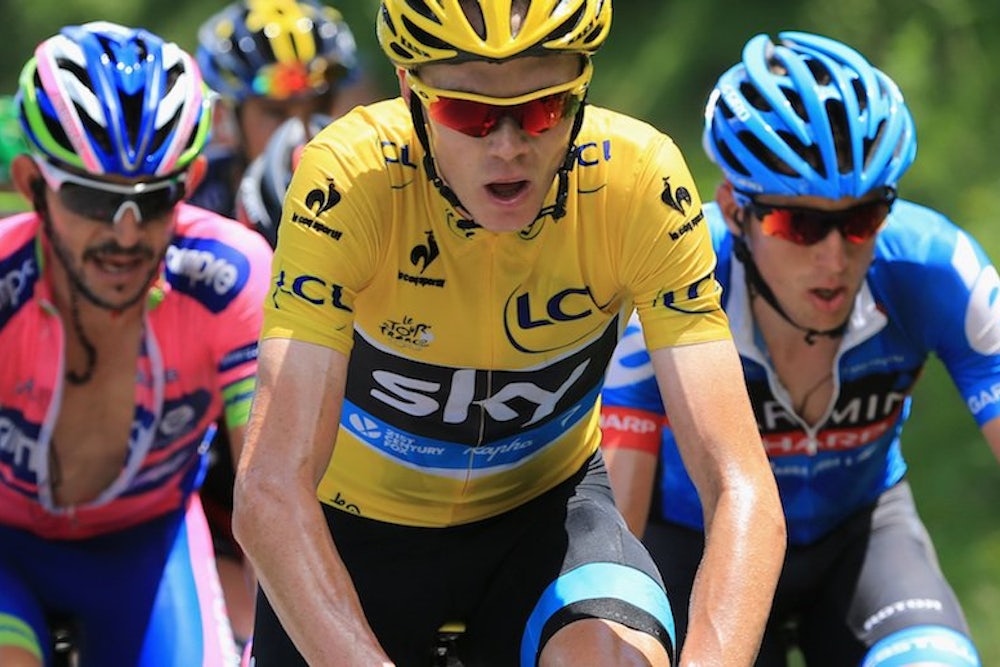Absorbed as they no doubt were by their national holiday and their own esoteric pastimes, Americans may not have realized that we have just lived through about the most glorious weekend in the history of British sports. On Saturday, vast numbers watched television enthralled as the British Lions, a quadrennial rugby touring team with the best players from England, Scotland, Ireland, and Wales, trounced Australia 41-16 in Sydney to clinch the best-of-three series.
On the following afternoon, Andy Murray ended a 77-year drought when he became the first British player to win the men’s singles at Wimbledon since Fred Perry in 1936. And he did so by not only beating Novak Djokovic, the top-ranked player of the moment, but by beating him in straight sets. Meanwhile not many miles from London SW19, at the Henley Regatta, the famous Grand Challenge Cup was won by the English club Leander, and the kids’ equivalent, the Princess Elizabeth Cup, was won by eight young oarsmen from Abingdon, a school near Oxford, in a contest which included schoolboy crews from Berlin, Boston, and Melbourne.
Along with sundry Hollywood riff-raff, the Wimbledon final was watched by David Cameron, the Conservative prime minister, and Alex Salmond, leader of the Scottish National Party. In the obnoxious way of pols, they were there for competitive bragging rights, as it were: Murray is British, and indubitably Scottish as well. Maybe President François Hollande was hoping for similar reflected glory when he looked in on Sunday’s stage of the Tour de France, but if so he was out of luck.
On Saturday the Tour reached the high mountains, the glorious and beautiful Pyrenees, and that first serious climbing stage was won by one more Briton, Chris Froome, who thereby donned the race leader’s maillot jaune, and held it the next day. Today is a Repos or rest day in Saint-Nazaire after the whole Tour flew from the south-west to Brittany, affording poor Hollande and his compatriots the opportunity to look back on the first nine stages of the Tour. They have been won by two Germans, a Belgian, and a Slovak, but also by two British riders and an Irishman, while the yellow jersey has been worn by a German, a Belgian, an Australian, a South African, and a Briton. I mentioned that before the race began, Christian Prudhomme, the Tour director, placed his hope in younger French riders like Thibaut Pinot; after the first week, the best-placed French rider is Jean-Christophe Péraud lying fourteenth in the general classification of aggregated time at 3 minutes 29 seconds behind the leader, while Pinot lies in fourty-seventh place, more than half an hour behind Froome.
Sunday’s stage from Saint-Girons to Bagnères-de-Bigorre was the most exciting of this Tour so far. There were five big climbs, the first of which, the Col de Portet-d’Aspet, is unbearably poignant, for there stands the handsome polished marble of the Stèle Fabio Casartelli. The most dangerous part of a bike race is when the riders reach the top of a high climb, with pedals agonisingly pushed inch by inch, and then, after cresting the pass, suddenly head downhill at 60 mph or more. Casartelli was a fine young Italian cyclist, a gold medalist at the 1992 Barcelona Olympics, and still only 24 when he rode for the Motorola team in the 1995 Tour. He had just begun to speed downhill from the Portet-d’Aspet when there was a crash. Casartelli flew headfirst into a concrete block beside the road, where that marble now recalls his death.
On Sunday the first rider past the Stèle was Arnold Jeannesson, a Frenchman, but that was a misleading augury. Although another French rider was favourite to win the stage, Thomas Voeckler had a really bad day and finished way behind the winner, who was yet another anglophone. Poor President Hollande was obliged to smile as broadly as he could while he presented the day’s prize to Dan Martin, the first Irish rider to win a stage since Stephen Roche in 1992. Roche had won the Tour in 1987 and he is, as it happens, Martin’s uncle.
What made Sunday so gripping was that while Froome kept his act together, his Sky team conspicuously did not not. A team leader usually relies on the assistance of his domestiques or supporting cast, but most of Froome’s team were blown away by the blistering pace. On Sunday morning Richie Porte was in second place, at 51 seconds behind his leader Froome, whom he was expected to help that afternoon. But Porte suffered a bad setback and dropped away from the leaders to end almost 18 minutes off the pace, falling to thirty-third place overall, and offering no help at at all to Froome, who had to do it on his own.
And what made that outcome so fascinating was that Sir Dave Brailsford didn’t mind. So his team isn’t freakishly perfect after all? "That's what we keep trying to tell everybody,” the Sky manager said. “People don't want to believe it. Maybe they will after today. The bigger picture may not be such a bad thing."
To unpack those words, he wants us to know that his team is very good, but not “extra-terrestrial,” as French journalists used to say ten years ago about Lance Armstrong and his U.S. Postal team, with a veiled meaning everyone can now understand. It might seem paradoxical, but times are getting slower in the Tour, and we’re all pleased, just as we’re pleased that no team and no rider dominates the field as the Posties and their leader used to do, by means we now know about for sure. Today the cyclists are back on planet earth, and thank the Lord for that.
